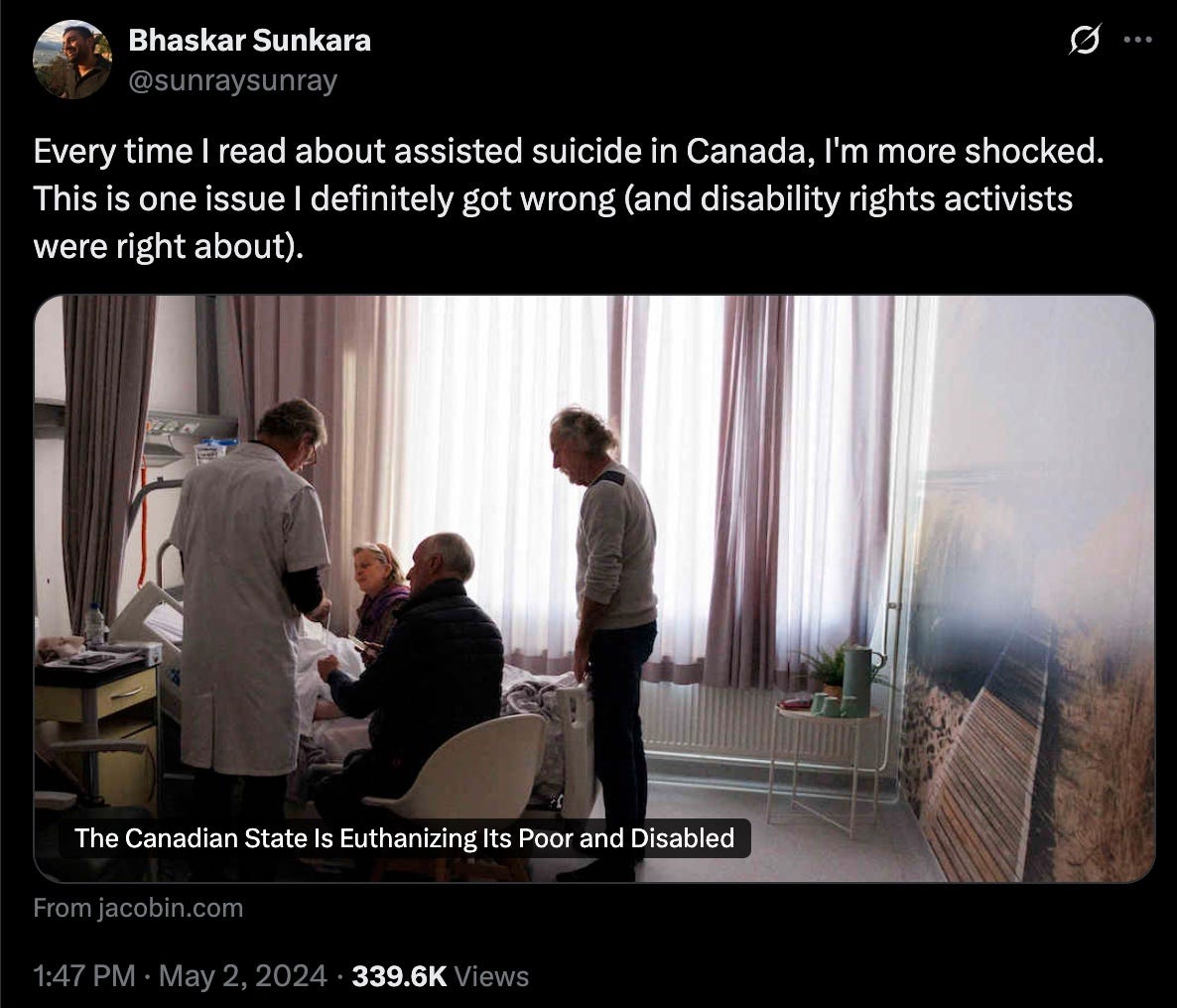Welcome to CrowdSource, your weekly guided tour of the latest intellectual disputes, ideological disagreements and national debates that piqued our interest (or inflamed our passions). This week: physician-assisted suicide.
Join us! CrowdSource features the best comments from The Crowd — our cherished readers and subscribers who, with their comments and emails, help make Wisdom of Crowds what it is.
The Global March of Physician-Assisted Suicide
CrowdSource covered assisted suicide last year (“Varieties of State-Sponsored Death”). The topic is still relevant:
Canada. In 2023, one in twenty of all deaths in Canada were from physician-assisted suicide. Around four percent of those deaths were of people without a prognosis of imminent death.
Uruguay legalized euthanasia last week, the first South American nation to do so.
Australia. The state of Victoria expanded its existing euthanasia law this year.
Slovenia will have a referendum on assisted suicide next year.
The United Kingdom. A law legalizing “assisted death” is winding its way through the British system.
The United States. Euthanasia campaigns are advancing in Oregon and New York City. Annette Bening and George Clooney are making a movie about assisted suicide.
Later this week, we will publish a new essay about assisted suicide, by Matthew Gasda.
For and Against
Two defenses of assisted suicide:
“My Mom — And the Case for Assisted Death.” A poignant essay by Coleman Hughes: “The only saving grace in my mother’s case was that she died somewhat sooner, and less painfully, than she otherwise would have …”
“I Absolutely Also Claim My Right To Say, ‘Enough.’” So says British actor Greg Wise in Elizabeth Oldfield’s podcast, The Sacred.
Two arguments against it:
Dying Well — and Hospice Care — Are Good. Assisted Dying Is Bad. Prognosis is always uncertain. Pain can almost always be managed. No one is fully autonomous. So argues Columbia University physician Lydia Dugdale.
Assisted Suicide Is a Fig Leaf for Cruelty. French novelist Michel Houellebecq, from an essay in Harper’s Magazine: “… the moment of farewell — a last chance to see certain people, to tell them what you may never have said before, and to hear what they may have to say to you. To cut short these death throes is both impious (for those who believe) and immoral (for anyone).”
Disability Activists Speak
Last November, Diane Coleman, a longtime activist against the legalization of physician assisted suicide, died at age 71.
“Assisted Suicide and Disability.” Born with muscular spinal atrophy, Coleman argued that assisted suicide would create perverse incentives for medical insurance companies. As she puts it in “Assisted Suicide and Disability” (2009):
Assisted suicide has been marketed to the American public as a step toward increasing individual freedom, but choice is an empty slogan in a world full of pressures on people with chronic illnesses and disabilities.
“The Perverse Economics of Assisted Suicide.” Last July, Louise Perry updated Coleman’s argument:
There is a very clear problem with assisted suicide in its new guise: The state, with its almighty power, is tasked with both paying for the support of the old and disabled and regulating their dying. Encouraging citizens to accept a Quietus may seem like a cost-saving measure at a time when the financial burden of their care has never been greater.
Socialists Reassess
Dovetailing with Coleman’s core insight — and because of the success (?) of the Canadian Medical Assistance in Dying (MAiD) law, which accounts for ~5% of all deaths in Canada — a few left-wing writers have become increasingly critical of physician-assisted suicide. This despite a long tradition of Left support for its legalization.
These writers eschew abstract ethical reasoning for structural analysis.
“The Canadian State Is Euthanizing Its Poor and Disabled,” says David Moscrop:
Disability and other advocates have been warning us for years that [physician-assisted suicide] puts people at risk. They warned that the risk of people choosing death — because it’s easier than fighting to survive in a system that impoverishes people, and disproportionately does so to those who are disabled — is real. Underinvestment in medical care will push people up to and beyond the brink, which means some will choose to die instead of “burden” their loved ones or society at large. They were right.
“Assisted Suicide Isn’t Freedom,” writes Ashley Frawley:
Assisted dying is the quintessential policy of our times. It is a policy that reflects the fatalistic mindset of those who rule over us, leaders who can no longer promise a good life so instead offer a “good death.” Opponents of assisted dying in Canada and elsewhere have asked how a society can maintain a commitment to preventing suicide with one hand while enabling it with the other. The answer is that our society doesn’t actually value human life and so doesn’t oppose suicide. What it opposes is the lack of a bureaucratic process that oversees, controls, and administers suicide.
“Canada’s Assisted Suicide Program Has Become a Nightmare,” writes
Jeremy Appel: “… it is beginning to look like a dystopian end run around the cost of providing long-term care.”
Bhaskar Sunkara, founder of Jacobin and president of The Nation:
From the Crowd
Is Tyler Cowen right about the United Kingdom? Is Santiago Ramos right about AI and jobs?
Something Rotten in the British Isles. Wisdom of Crowds contributor Sam Mace takes issue with something Tyler Cowen said about the UK in our latest podcast:
… As a Brit, I found that section quite interesting. I both agreed with Tyler that something is rotten in the UK, and there is a general feeling of stagnation and breakage that is pervading the population. I do also think there is something in the idea that politicians should take a more Burkean approach of leading their population as opposed to following them. But, I think Tyler here was arguably wrong on two counts. The first, I think, was proclaiming the usefulness of our elected representatives. Unfortunately, for some of the reasons discussed by Tyler (poor pay and an over-reliance upon communication), we currently have a significant talent gap in our politics. This is not helped by how candidates are selected by their parties tbh. Second, the very mechanics of elections and the self-serving nature of some of our representatives limit the ability to enact bolder change. They want to be re-elected, and this limits the steps they are willing to take. , but that question, specifically on liberalism. […]
Ditch-Diggers, Typesetters and You. Responding to last week’s CrowdSource, loyal Wisdom of Crowds commenter The Radical Individualist suggests that Santiago Ramos might be overestimating the scale of the AI revolution:
AI is just another step in a centuries old process called the Industrial Revolution.
How many thousands of ditch-diggers have lost their jobs to backhoes? Easily, hundreds of thousands. But it happened decades ago, and we’ve all forgotten about it (if we ever even thought about it).
How many stagecoach drivers lost their jobs to trains? How many bookkeepers have lost their jobs to computers? How many airline reservation clerks have lost their jobs to do-it-yourself online booking?
How many typesetters have lost their jobs? ALL of them. Nobody sets type anymore.
AI is just another step, not some revolutionary game changer. Perhaps it gets greater attention because it is affecting people who report on such things. THEY are losing their jobs this time.
See you next week!
Wisdom of Crowds is a platform challenging premises and understanding first principles on politics and culture. Join us!






Twenty years ago I wrote an essay about depression, which, as you know, is responsible for a great many suicides. Near the end I offered a very practical policy solution for reducing depression-related suicides, which very well might apply to others as well. Of course, that solution is only practical in a society with a lively moral imagination, which in turn is only possible if influential public-affairs websites like this one embrace rather than abjure or scoff at morality.
https://agnionline.bu.edu/essay/message-from-room-101/
Lord, have mercy....